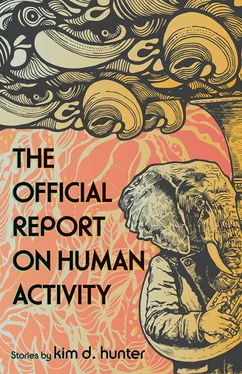Speculation has become one of my principle pastimes here on death row. I have tried to imagine what would have happened if my desire to be with people, albeit at a certain distance, had faded from me before the Deep Seven went up for sale. I probably would have invested my money and lived until I disappeared. My appetites would have changed. I may have avoided the light (I am writing this now with lights out, surely a residual of the old form) and probably would have been discovered one day by a surprised accountant or servant (would I have hired people to “keep” the house?) only to be summarily squashed. News of my disappearance would’ve made the headlines. My death would be nothing more than a strong assumption, a conclusion as unavoidable as it would have been without evidence. One moment I was present and accounted for; the next, inexplicably gone, when, in fact, I’d have become both invisible and unwelcomed.
* * *
The prison chaplain is a slightly pudgy, kindly man. I overheard the guards say he looked like he probably used to have his lunch money taken from him as a child. For all their chiding, he is a man of great and subtle gifts. Including my trial lawyer, he is the first person that truly understood my confession. Not that he believed how I killed. That seemed incredible even to him. What he reflected and what I began to understand for the first time was what was happening to me, how I was focused when I took their lives.
Perhaps you have had a compulsion, a desire that shreds what appeared to be the good steel net of your will, an instinct that collapses time and creates a vacuum that begs to be filled and can only be filled with a certain act, which is to say a certain reality lived through that act, the end sublimated to its means. The prison chaplain understood this, though I doubt he’d ever had such desire. It is an odd, vicious creature he knows not from experience, but from its bloody wake. When we spoke, his eyes never left mine; his expression was a combination of familiarity and loathing, as he nodded slowly and patiently absorbed my quasi-coherent ramblings, my struggle to describe being moved by fire, by a combustion of tangled emotions and rationales that nonetheless left me focused as the edge of a scalpel.
The chaplain’s attentiveness never kept him from his ultimate goal of changing me. Indeed, the more he delved into me, the more he tried to “let God reclaim” my “soul.” Every discussion we had, regardless of where it began, wound up in the same place. He could have been a politician. The media relations person at the company I ran would have kissed the chaplain’s feet for staying so on message. Once, I asked him if prison or at least a place like prison wasn’t the perfect place for someone who didn’t want to engage the world and its vices. I posited to him that it was not just the controlling atmosphere, but how the lack of activities and freedom forced one to focus on the self. The chief effect of all of this was to slow time to a crawl. He asked if I’d ever heard of monasteries, said that those places had all the good and none of the bad aspects of incarceration. But then the chaplain used the subject of time to pivot onto the curious concept of eternity. From there, it was easy to speak of what he believed would happen after we die. He was sincere and oddly nonjudgmental, as if conveying the benefits of exercise or a healthy diet. When I told him I’d had all the transformation one creature could stand, he smiled and almost laughed. It was the happiest I’d ever seen him look.
As I mentioned previously, the Whistling Dragon began life as the Deep Seven. The only remnant from the old days was a music machine I never learned to operate. The first time I saw the place was on a screen. I was sitting with my biographer trying to steer the subject away from me. The program featured what I had to imagine were scenes recorded in the twentieth century. The images didn’t have the full range of colors or the crisp presence of most images. The sound was different as well. You could actually tell it was coming from the screen. Moreover, the content was fascinating. If the biographer said anything during the first ten minutes or so, I certainly didn’t hear her.
On screen was a man with an oversized but not life-sized doll sitting on his knee. The figure moved and spoke and, at first, I had no idea that it did so at the man’s behest. It took me a moment to notice how very close they sat to one another. Then it struck me how oddly the man held his mouth while the doll spoke. When it all dawned on me, I felt stupid, almost duped. The irony of my confusion struck me like a thunderbolt. I almost doubled over with laughter. The biographer smiled, curiously.
“I thought you were old enough to have heard that joke before,” she said.
In fact, I’d been so fascinated with the scene, I didn’t even realize the man and dummy were telling jokes. Though, indeed, what else could they have been doing? I was able to refocus when the biographer changed the image or the channel. That is when I saw a man identified as Tyrone, the “owner” of the Deep Seven, being interviewed, reluctantly, on the street. He looked nervously between the interviewer, the camera, and the place in the background. He moved away several times, causing the reporter to finally drop all of her questions. Then there were scenes inside a place I could only assume was the Deep Seven. There were no people but, somehow, it did not seem empty. Some chairs were strewn helter-skelter and some sat around square and round tables, as if waiting for patrons. It was dim and cozy with a great deal of dark brown wood.
“There’s a place with some history,” my biographer said. “And speaking of history…” she went on, trying to revive our conversation.
It would be a while before I would see the place again. I was tempted to write, “I was a different person then.” But “different” and “person” are inadequate, and incorrect respectively. The change in that time, deep as it was, was dwarfed by the change to my current form, and I am unsure if that change makes the term “person” apply to me. It is a term of convenience, whose use has been programmed rather than naturally learned.
The Deep Seven more than intrigued me. Upon seeing the bar on TV, the house in which I lived seemed suddenly less inviting. Intellectually, I had known what people meant when they used the word “sterile” to describe a living space as undesirable. But I had never felt that way about where I was living until that moment we switched the channel. Perhaps, it may have been the first inkling of the experiment fading, but the dark seemed tantalizing, warm. The space I was in seemed over-lit. Even on the screen (or was it because of the screen) I could see a more human mark on that place, and was I not, at least then (and perhaps now) a human?
As much as I was attracted to it, the idea of transforming the place into something that was mine gnawed at me for months. I looked up the location and directions but there were two addresses for the same place. Then, one impulsive night, I got up from a half-eaten meal, jumped into the car, and got lost, drove past the Main Library, naturally thought of my biographer, and rambled on through neighborhoods east of Woodward Avenue. I made the mistake of stopping near the Heidelberg Project to ask directions. One group of young people with oddly colored hair at first ignored me. Some spoke amongst themselves while others gaped open-mouthed at the collection of objects—shoes, dolls, car parts, stuffed animals, et cetera—fixed onto trees and polka-dotted wooden houses and arranged in rows on vacant lots between. When I finally got their attention, they told me they were not from the area and couldn’t help me.
I turned to see a young woman getting out of a car she’d just parked. She went to the rear passenger door to remove a toddler in a car seat. Surely, I thought, this woman was from the area and would know the Deep Seven. Her face tightened as I approached. She was silent for a few seconds after I asked directions. Then she looked up and asked if I was “with them,” nodding to the young people. When I said no, expecting her manner to lighten, she was silent for a few more seconds before virtually spitting her words at me.
Читать дальше












